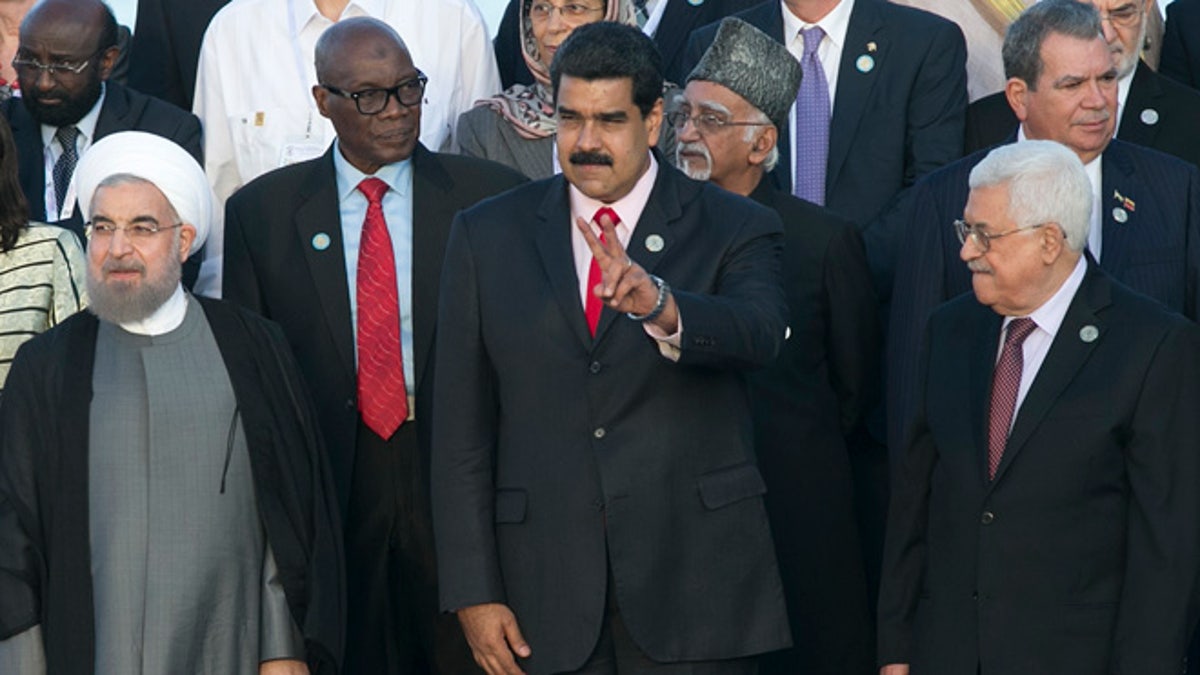
Iran's President Hassan Rouhani, front row, from left, Venezuela's President Nicolas Maduro, and Palestinian President Mahmoud Abbas, gather for an official group photo at the 17th Non-Aligned Movement Summit in Porlamar, on Venezuela's Margarita Island, Saturday, Sept. 17, 2016. (AP Photo/Ariana Cubillos) (Copyright 2016 The Associated Press. All rights reserved.)
PORLAMAR, Venezuela (AP) – Crisis-hit Venezuela's economic and political problems are keeping world leaders away from a meeting of the Non-Aligned Movement that was supposed to hit its full stride on Saturday.
Only 12 heads of state have arrived for the two days of meetings taking place on the Caribbean island of Margarita, including the leaders of Iran, Cuba and Zimbabwe. More than 30 world leaders attended the last summit of the Cold War-era group, held in Iran in 2012.
President Nicolas Maduro had touted the Non-Aligned Movement's 17th summit as an opportunity to increase international solidarity for his socialist government as the oil-dependent economy reels from widespread food shortages and triple digit inflation.
But the scarce attendance after months of shuttle diplomacy handing out invitations is likely to embolden Maduro's opponents, who are pushing for a referendum to remove him from office before his term ends in 2019. They say the low turnout is a sign of Maduro's increasing isolation.
Of those leaders present, more than half are Maduro's close ideological allies and recipients of oil subsidies in Latin America and Caribbean. The first leader to arrive was Zimbabwe's 92-year-old President Robert Mugabe, who was slow descending from his aircraft on Thursday but showed no hesitation addressing delegates Saturday with a stinging criticism of foreign military intervention in conflicts in the Middle East and northern Africa by a country or countries he did not name.
- Dancing in Chile to protest dictatorship disappearances
- Best pix of the week
- 123,000 Venezuelans cross border to Colombia looking for food
- Venezuelans turn to urban gardens amid growing food shortages
- Venezuela’s socialist leaders show oversized taste for Swiss watches
- Venezuela’s luxury resort island devastated by economic crisis
The low turnout was even more remarkable because leaders are making their way to and from New York, a five-hour flight away, for the annual United Nations General Assembly. Secretary General Ban Ki-moon, who attended the last summit of the largest political group comprised of U.N. member nations, sent a video message.
Maduro addressed the Non-Aligned gathering in a speech that laid out an 11-point agenda Venezuela will promote as the group's temporary president, including U.N. reform, support for Palestinians and a call for Puerto Rico's independence. He spoke defiantly about Venezuela's problems, blaming them on the country's foreign enemies.
"Venezuela is facing a global attack, which is against all of Latin America and Caribbean," he said. "An attack that aims to impose a political, economic and cultural reorganization of our countries with the old oligarchy."
Venezuela's Oil Minister Eulogio Del Pino also said he's trying to build consensus around a fair price for oil to help economies like his own that have been battered by the collapse in crude in recent years.
Tensions have been running high on Margarita in the run-up to the summit, with the opposition trying to use the media attention focused on the gathering to embarrass Maduro. In one high-profile incident caught on cell phone videos two weeks ago, Maduro appeared to have been chased away by a group of angry, pot-banging protesters after his caravan stopped in a poor neighborhood.
The government has put a brave face on its problems, importing food and water so that shortages that have devastated the once-booming resort island aren't felt by visitors.
Officials also unveiled next to the summit venue a nearly 3-meter tall bronze statue of the late Hugo Chavez with his hand raised. The opposition has compared it to one of Saddam Hussein that was toppled in Baghdad following the U.S. invasion in 2003.
While international visitors have largely shunned Margarita, home to about 600,000 residents, the government is helping bring in throngs of die-hard supporters from all over Venezuela. Hundreds are camping in tents pitched on a beach near one of the island resort's toniest neighborhoods.
At night, loud reggaeton music blaring from a giant concert stage competes with the din of banging pots and pans in a war of noise between the two sides of Venezuela's deep political divide.
"It's very important to say no to capitalism, to imperialism," said 14-year-old Jose Luis Rodriguez, who traveled 12 hours in a state-provided bus from the central state of Carabobo. "What country in the world doesn't have a crisis?"







































